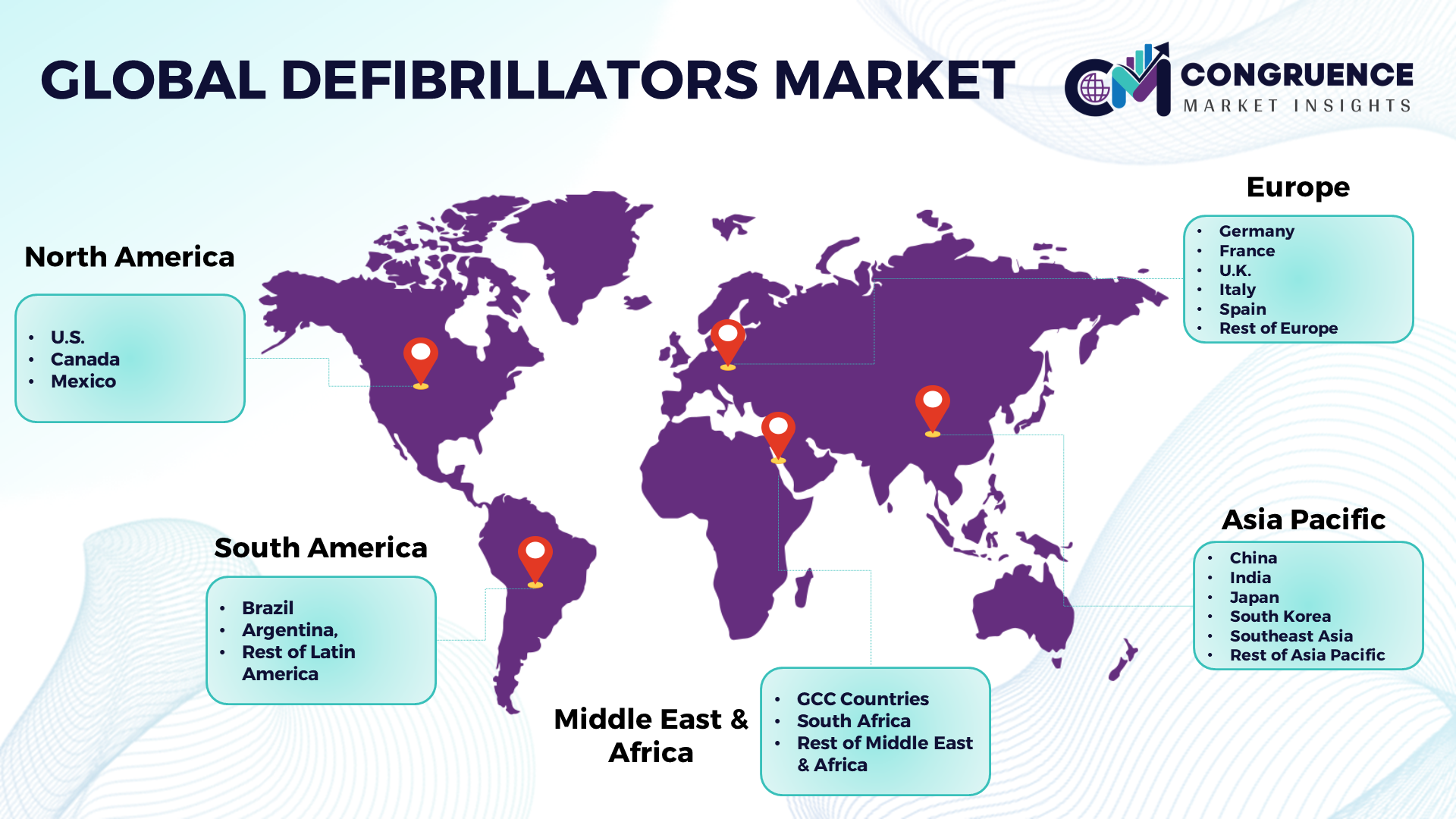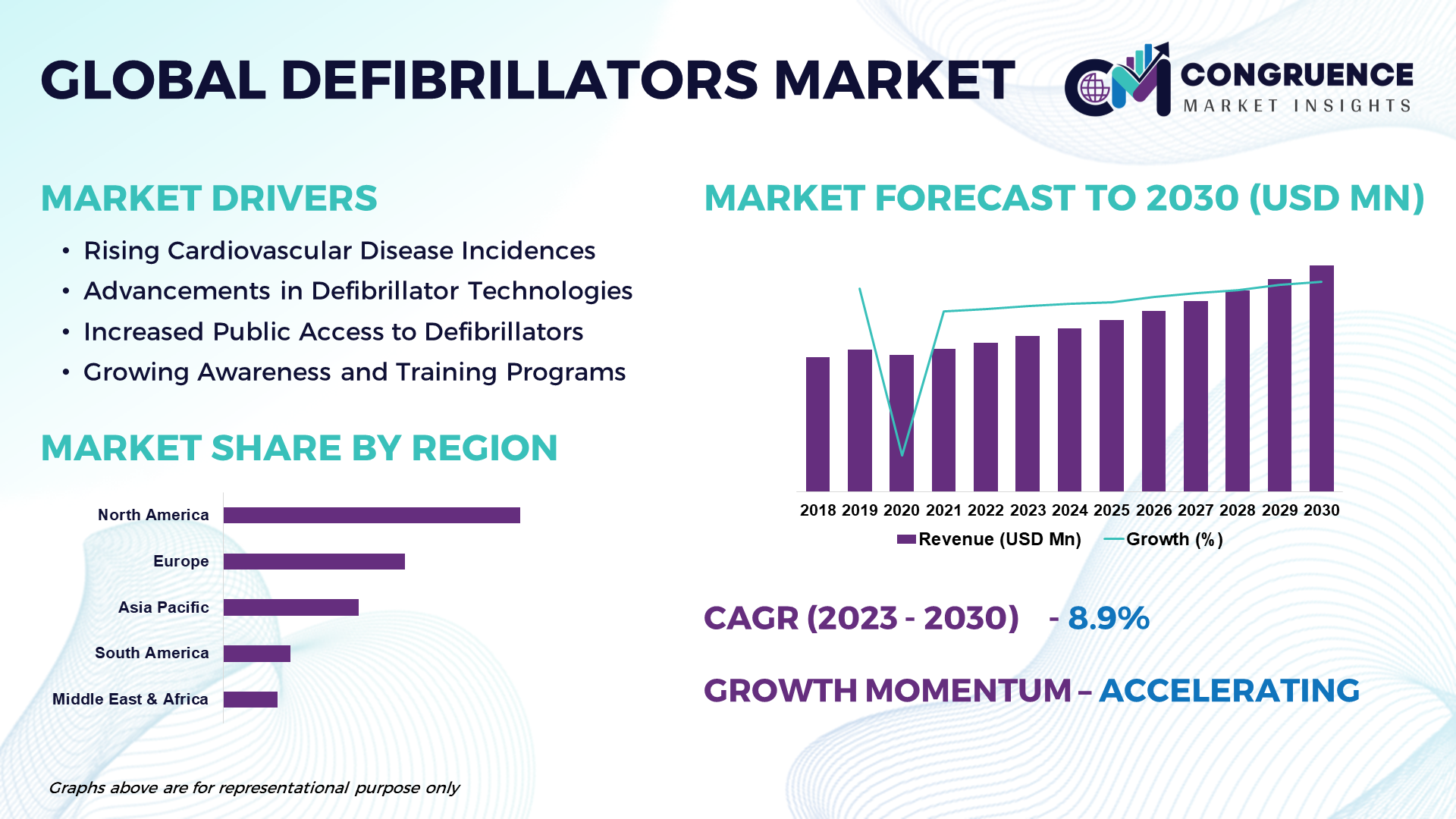Reports
Defibrillators are life-saving medical devices designed to deliver an electric shock to the heart in cases of sudden cardiac arrest. With various types including Implantable Cardioverter Defibrillators (ICDs), External Defibrillators, and Wearable Cardioverter Defibrillators, the global defibrillators market is witnessing robust growth. External defibrillators, comprising both manual and automated options, are crucial in emergency situations. Implantable devices offer continuous monitoring and intervention for patients at risk. The market is fueled by increasing awareness about cardiac health, advancements in defibrillator technologies, and a growing aging population. Projected to grow at a CAGR of 8.9% from 2023 to 2030, the defibrillators market plays a pivotal role in addressing cardiovascular emergencies globally.

Defibrillators Market Major Driving Forces
Rising Cardiovascular Disease Incidences: The prevalence of cardiovascular diseases is a significant driver for the defibrillators market. With an increasing aging population and lifestyle-related factors, the demand for defibrillators is rising to address the growing instances of sudden cardiac arrest.
Advancements in Defibrillator Technologies: Ongoing technological advancements in defibrillator devices, including improvements in implantable technologies and the development of more user-friendly external devices, are driving market growth.
Increased Public Access to Defibrillators: Initiatives promoting public access to defibrillators in locations such as airports, schools, and public spaces contribute to market growth. The emphasis on early defibrillation in emergency situations is saving lives.
Growing Awareness and Training Programs: The increasing awareness of the importance of early defibrillation and the availability of training programs for using defibrillators are crucial factors in market expansion.
Defibrillators Market Key Opportunities
Homecare Defibrillator Solutions: The rising trend of home healthcare presents an opportunity for the defibrillators market. Manufacturers can focus on developing user-friendly, portable, and automated defibrillator options for use in home settings.
Integration of Artificial Intelligence (AI): The incorporation of AI in defibrillator technologies can enhance diagnostic capabilities and provide more personalized treatment options. AI-driven defibrillators could offer real-time monitoring and response based on individual patient needs.
Global Expansion of Public Access Programs: Collaborations and partnerships to expand public access defibrillator programs globally provide a substantial opportunity. Increasing the number of defibrillators in public spaces can significantly improve survival rates in emergency situations.
Defibrillators Market Key Trends
· Miniaturization of Implantable Defibrillators: The trend towards smaller, more discreet implantable defibrillators is gaining traction, providing patients with enhanced comfort and aesthetic appeal.
· Integration of Connectivity Features: Defibrillators with integrated connectivity features, allowing remote monitoring and data transmission, are becoming a trend. This facilitates healthcare professionals in managing and responding to patient needs more efficiently.
· Focus on Wearable Defibrillators: Wearable Cardioverter Defibrillators (WCDs) are witnessing increased adoption, especially for patients at temporary risk of sudden cardiac arrest. These devices offer a non-invasive solution for continuous monitoring.

Market Competition Landscape
The global defibrillators market is marked by intense competition among key players, each striving to maintain a competitive edge. Strategies such as continuous product innovation, partnerships, and adherence to stringent quality standards are common approaches. Notable players in the market include:
· Medtronic
· Philips Healthcare
· ZOLL Medical Corporation
· Physio-Control, Inc. (Stryker)
· Boston Scientific Corporation
· Abbott
· Nihon Kohden Corporation
· CU Medical Systems, Inc.
· LivaNova PLC
· Schiller AG
These industry leaders contribute significantly to the market by offering a diverse range of defibrillator products and solutions, addressing the evolving needs of healthcare professionals and patients alike.
|
Report Attribute/Metric |
Details |
|
Base Year |
2022 |
|
Forecast Period |
2023 – 2030 |
|
Historical Data |
2018 to 2022 |
|
Forecast Unit |
Value (US$ Mn) |
|
Key Report Deliverable |
Revenue Forecast, Growth Trends, Market Dynamics, Segmental Overview, Regional and Country-wise Analysis, Competition Landscape |
|
Segments Covered |
· By Product Type (Implantable Cardioverter Defibrillators (ICDs), External Defibrillators (Manual External Defibrillators, Automated External Defibrillators), Wearable Cardioverter Defibrillators) · By End-user (Hospitals, Clinics, Public Access Settings, Homecare) · By Technology (Semi-automated External Defibrillators, Fully Automated External Defibrillators) |
|
Geographies Covered |
North America: U.S., Canada and Mexico Europe: Germany, France, U.K., Italy, Spain, and Rest of Europe Asia Pacific: China, India, Japan, South Korea, Southeast Asia, and Rest of Asia Pacific South America: Brazil, Argentina, and Rest of Latin America Middle East & Africa: GCC Countries, South Africa, and Rest of Middle East & Africa |
|
Key Players Analyzed |
Medtronic, Philips Healthcare, ZOLL Medical Corporation, Physio-Control, Inc. (Stryker), Boston Scientific Corporation, Abbott, Nihon Kohden Corporation, CU Medical Systems, Inc., LivaNova PLC, Schiller AG |
|
Customization & Pricing |
Available on Request (10% Customization is Free) |
